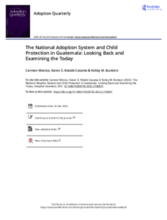This article discusses the evolution of adoption policy and practices in Guatemala from the 1990s to 2021. The authors synthesized their own research and analyzed adoption scholarship and reports and organized that history into three distinct periods:
(1) conflict years (1966–1996) when mostly Guatemalan military families and associates adopted stolen children,
(2) post-conflict and millennium adoption years (1997-2007) when the commercialization of children and illicit adoptions surged, and
(3) reform years (2008 to date) when new adoption regulations and institutions were established.
The article concludes that Guatemalan regulations aligned with international conventions improved domestic adoption, but gaps remain within the adoption and child protection system.

